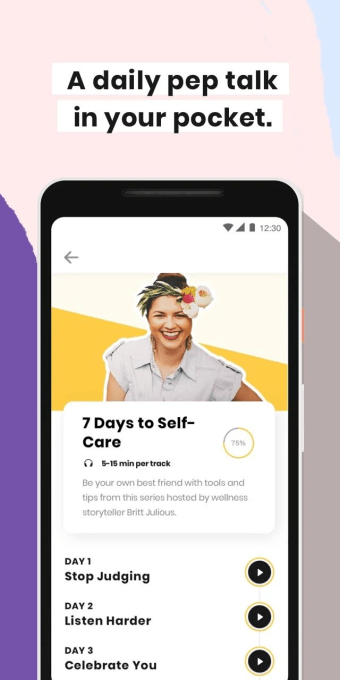Shine, one of the many apps capitalizing on the growing self-care trend, has now brought its app used by 3 million people to Android devices. Originally launched as a simple messaging bot that doled out life advice and motivation, Shine has grown over the years to become a larger self-help platform aimed largely at the millennial crowd – and in particular, millennial women.
As of Shine’s $5 million Series A round last April, the app’s user base was 70 percent female, and 88 percent were under the age of 35.
Since then, it has added another million to its then 2 million users. That growth came despite Shine having missed the mark at times, as with its failed life-coaching subscription product that never emerged from testing.
Today, Shine’s focus is on personal growth, motivational messaging, and other self-improvement topics, which are delivered by way of both text and audio. Through short-form audio, users can get help across a number of areas, including things like productivity, mindfulness, focus, stress and anxiety, burn out, acceptance, self-care for online dating, creativity, forgiveness, work frustrations, and more.
 The app also sends daily motivational texts based on research-backed materials that help users better understand the topic at hand. These are presented in a more casual style – almost like it’s a friend chatting with you.
The app also sends daily motivational texts based on research-backed materials that help users better understand the topic at hand. These are presented in a more casual style – almost like it’s a friend chatting with you.
Shine now monetizes through a Premium subscription that offers expanded access to Shine’s audio talks and challenges, as well as additional features like offline listening and the ability to save favorite texts. This is either $4.50/month if you pay the $53.99 annual fee at once, or $9.99 per month. That’s roughly in line with what some meditation apps charge – for instance, the top meditation app Calm is $59.99 per year. And it’s cheaper than Headspace, which is $95.88 annually, by comparison.
Shine had said last year that one of its plans for its Series A was to build out the Android experience as nearly half its customers were accessing Shine on Android devices. In those cases they were using the texting service due to the lack of an official app.
On iOS, Shine is fairly popular in its category. It has jumped to become the No. 16 “Health & Fitness” app in the U.S., following the Christmas holiday – a time of the year when people get serious about wellness and self-care. However, it’s only the No. 86 ranked app on the “Health & Fitness” Top Grossing chart, which puts it far behind other wellness apps including meditation apps like Calm, weight loss apps like Lose It!, and workout apps like the No. 1 app, Sweat from Kayla Itsnes.
Given the app stores’ larger shift to subscriptions over paid downloads in recent years, it will be interesting to see how many apps the average consumer will actually pay for through the subscription model – and to what extent more niche apps like Shine will be sustainable in the long term, as a result.
Shine is a free download on Google Play.